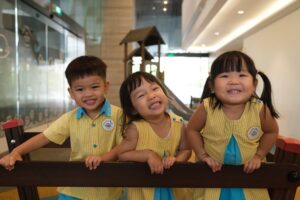BACK
Guide to Choosing a Preschool
With your child entering their formative years, as a parent, you may have several questions and stresses of finding the p erfect preschool and navigating your way through the array of choices. If it is your first child that you are choosing a school for, it may very well be one of the biggest parenting decisions you will have to make. With over 2000 preschools in Singapore that offer a variety of programmes, specialised curriculums, and facilities, there are several factors to consider so that the best preschool that fits the needs of both you and your child is chosen. From full-day childcare and kindergartens to learning philosophies, we cover the top 5 things to consider when choosing a preschool.
1. Your Needs
Preschools are attended by young ones before taking the big leap into compulsory primary school education. With childcare centres and kindergartens being the primary provider of an educational environment for children aged 3 to 6 years old, parents need to decide which of these options cater to their specific needs. Childcare centres typically offer full-day programmes, while kindergartens, if run by MOE, offer 4-hour programmes. Some preschools like The Little Skool-House also offer infant care programmes (2 months to 17 months) for working parents in Singapore. With these options at hand, it is best to take a step back, and reflect on these three questions, “Do we require both education and care components in the programme?”, “Is the school of choice within our budget”, and “Is it conveniently located?” These will help ease the decision-making process and narrow down your options to a targeted few.
2. Singapore Preschool Curriculum
Every school boasts its own unique pedagogy, and choosing a preschool with a curriculum that not only subscribes to your preferences but also supports holistic development, is crucial. Look through the preschools’ varied curriculums and determine its primary focus of each age group and if it adapts with growth. Even if a curriculum seems comprehensive on paper, a school with a team of well-trained teachers will help you ascertain if the school can hone the skills and achieve maximum learning goals they have set within their established learning environment.
With bilingual preschools on the rise in Singapore, the approach each school takes when incorporating a well-rounded bilingual curriculum varies dramatically. The Little Skool-House (LSH), for example, is a bilingual preschool in Singapore that engages students in a curriculum that has led to High Proficiency in English and Mandarin through equal emphasis on both core languages. Such preschools are thus a better option for parents with the goal of having their children be bilingual upon graduation.
3. Learning Philosophy
Just like how every parent has their own parenting goals, every school has its own approach to education. As simple as it may sound, it is quintessential for parents to reflect on their goals and decipher if it is aligned with that of the school’s learning philosophy. Even if a preschool has a good reputation, its teaching style and philosophy may not be in line with your conventions on why preschool education is important for your child.
4. Niche Enrichment Programmes
Tuition classes and enrichment programmes have become a norm since parents are enthralled by its ability to equip children with competency skills essential for their future. Instead of sourcing for these programmes elsewhere, some schools are designed with specialised learning pedagogies that expose students to areas of interest such as dance to cultivate a love for learning. Enquire how these classes are structured to ensure that it will instil and inculcate in your child the habits of an active learner.
5. School Culture
A well-established relationship between teacher and child is critical for healthy development, thus explaining the rise in relationships-based preschool curriculums in Singapore. But what about parent-teacher relationships? Schedule a visit with the school and take advantage of the opportunity to ask questions related to you and your child – What are their methods of discipline, will the parent-teacher communication style be a one-way or two-way exchange, and what are the ways rapport is built between parents and teachers. Communicating with the educators on such topics will give you a gist of the school’s culture and if it is one that will allow seamless integration.
Take a walk around the campus and see if it encourages collaborative learning and fosters a sense of community. Observe how your child interacts with the space and if they are suited to the teacher-student ratio. Also, check the cleanliness of classrooms, and if the meals inculcate healthy living. Be sure the school’s learning environment coincides with their stated curricular approach – do they have play areas that coincide with their supposed play-based approach?
Choosing a school or childcare centre may seem tedious, but if done successfully, it is a great stride towards your child’s future development. Take advantage of the passion of every educator and build a relationship with them to help guide your child through life.



